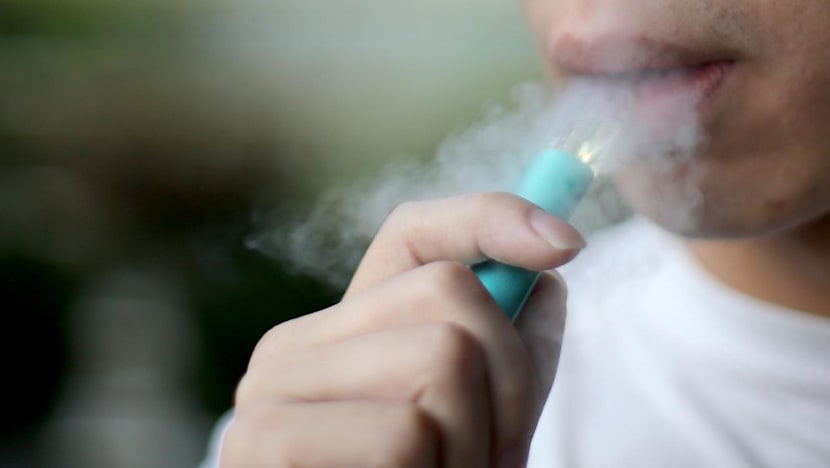'For her own good': Why this father reported his teen daughter for using drug-laced vapes
The girl was introduced to Kpods – vapes laced with etomidate – by her friends.

Daniel involved the police twice in hopes of getting his daughter to stop vaping. (File photo: iStock)

This audio is generated by an AI tool.
SINGAPORE: Daniel (not his real name) was shocked when he found out his daughter was using kpods – vapes laced with etomidate, an anaesthetic agent.
“She was so high on the bed … she was shivering and she didn’t know what she was doing until a couple of minutes later, when she started to sober up,” he said.
Josephine (not her real name) has always been close to her father. If there was anything she was upset about, she would turn to him. To Daniel, she was the “apple of his eye”, and he “pampered” her the most among his children.
He was heartbroken when he found out she had turned to illegal substances – and he decided to report her to the police.
The identities of Daniel and Josephine are protected under the Children and Young Persons Act, as Josephine was under 18 at the time of the offences.
Daniel is not the first person to report his child to the authorities for vaping.
Earlier this month, it was reported that a 15-year-old boy was ordered to spend two years in the Boys’ Home — a juvenile rehabilitation centre — for possessing a vape, harassing a police officer and other offences.
His mother had called the police, saying her son was “going crazy” after vaping.
On Sep 1, etomidate was listed as a Class C drug in the Misuse of Drugs Act, which meant enhanced penalties for vaping offences.
Since then, at least 60 people have been placed on rehabilitation programmes at the Institute of Mental Health, Health Promotion Board and social service agencies.
A FATHER’S HEARTBREAK
Daniel found out that Josephine was vaping when his younger daughter, with whom Josephine shared a room, complained about the smell.
Josephine, a polytechnic student, had been introduced to Kpods by a group of friends, including her boyfriend at the time. She became addicted, said Daniel.
“I was feeling very angry, as well as feeling very sad,” he added.
“Angry, because she started to (use) this Kpod, and I was feeling sad because she’s so young. Why is it that she wants to go down this road to try all these illegal substances?”
Josephine was a different person before she was using the drug-laced vapes.
Once a jovial person who would talk to her family about “anything under the sun”, she had become pale and withdrawn, losing her appetite to eat.
Three months after he found out she was using vapes, Daniel decided to report his daughter to the police.
“Initially, we gave her an opportunity, a chance to stop vaping. She told us … she will stop. But eventually, she didn’t stop, and just kept vaping and vaping,” Daniel said.
He added: “She was willing to go down to the station with us, because I told her it can’t go on like that.
“If she wants to change, she needs to change. She has to go down to the station to surrender herself.”
Josephine was fined by the Health Sciences Authority (HSA) for using vapes.
“She understands what we are trying to do. What we want to do for her is for her own good,” said Daniel.
“We (Daniel and his wife) talked to her for quite some time, and she decided (that) she wants to change.”
"ANGRY AND SAD"
If Daniel thought that was the end of the matter, he was wrong – Josephine continued to vape.
Her family tried to get her to stop but they were unsuccessful, and two to three months after the first report, Daniel called the police.
“We were angry and sad at the same time – angry because she was addicted to this Kpod.
“We were sad because we tried to talk to her to persuade her, but it was like she just continued to take the Kpod, which is why we decided the second time to call up the police,” he said.
She was fined again. At the time, Josephine was also under investigation for a rioting case from 2024.
Following meetings with the authorities, Daniel and his wife were given two options: to put Josephine on probation with tagging for a year, or serve time in the Reformative Training Centre (RTC).
They chose the latter.
The RTC houses youths under 21 who are deemed suitable for reformative training. The objective of reformative training is to provide rehabilitation and reintegration into society.
Josephine entered the RTC in July for the start of a six-month term, and Daniel visits her twice a month. He also sends her “e-letters” frequently.
“I can see that she has become happier and she put on weight … Once she was addicted to Kpod, she lost a lot of weight because … she didn’t have an appetite to eat,” he said.
He added: “To see her, we need to book the time, and it’s very difficult to get the date because there are limited slots. Whenever I get to see her, I just ask her about her well-being.”
During her time in the RTC, Josephine attends counselling sessions and has also met others who have shared their experiences.

Mr Sean Ang, a smoking and vaping cessation counsellor at Success Alliance Enrichment, said that RTC distances inmates from being able to access substances, while supporting them during their rehabilitation.
“In our interactions, we tend to meet youths where they are – not where society expects them to be,” he said.
“There is a big focus on understanding why they vape/the emotions that drive them towards vaping. With that understanding, it's easier to explore different alternatives to cope with those reasons and emotions.”
Change takes time, and it can occur over multiple sessions. In the first few sessions, confidence and self-esteem typically grow before the counsellor works on a plan with the patient.
“With ownership and guidance, it gives them confidence and strength to reduce their dependence on vapes, and many are successful at cutting down smoking or vaping frequency.”
On her birthday, Daniel was unable to secure a visitation slot, but he sent her an e-letter instead.
“She replied, saying that “it’s okay, it’s the thought that counts”, and she understands that it’s not easy to book a date that we want. At least she was happy that I remembered her birthday,” he said.
There has been no relapse since she entered the RTC, and he said she feels happier now because she is “totally cut off” from the vapes.
“Her face is more rosy now, compared to the pale face when she was doing Kpods, she was very pale.
“So, right now, she’s feeling better. She looks livelier, and she knows that I sent her to the RTC for her own good.”
Looking back, Daniel said Josephine felt that they were drifting apart. With Daniel working night shifts sometimes, he does not get to see his daughter often.
“The time she spends with us is not as much as the time she spends with her friends,” he said.
SMALL WINS
If a young person is quitting vapes, celebrate the small wins, said Mr Ang.
“Big successes are made up of small wins. This could mean even showing up for a counselling session, or a cut down in the frequency of vaping (whether or not it met the planned target reduction),” he added.
If there are slip-ups, be compassionate. Being empathetic encourages more honest and open conversation, said the counsellor.
At the end of the day, the home should feel like a place where they feel safe, rather than a house of harsh discipline and intense scrutiny, he added.
During one of Daniel’s visits, Josephine shared that she wants to resume her polytechnic studies.
“I spoke to her on … the next step after she is released. She mentioned she will return to school to continue her studies,” Daniel said, adding that the school intends to give her a second chance.
He plans to spend more time with her once she is released, although he acknowledged he cannot constantly monitor his daughter.
“I think (I will) communicate with her more whenever I’m off or after work, because she might be feeling neglected because we are always at work, and (when we) come back, we are so tired, so we do not communicate so much,” said Daniel.
“On this point, I need to work on communication.”
Daniel urged other parents to spend more time with their children. “See what they are doing, spend more time with them and communicate with them more,” he said.
He hopes that Josephine will be able to overcome her vaping addiction.
“Everyone is hoping that after her release, she will be back to her old self. Even she told me that she will be a better person after her release,” Daniel said. “I’m quite happy that she said that.”


















